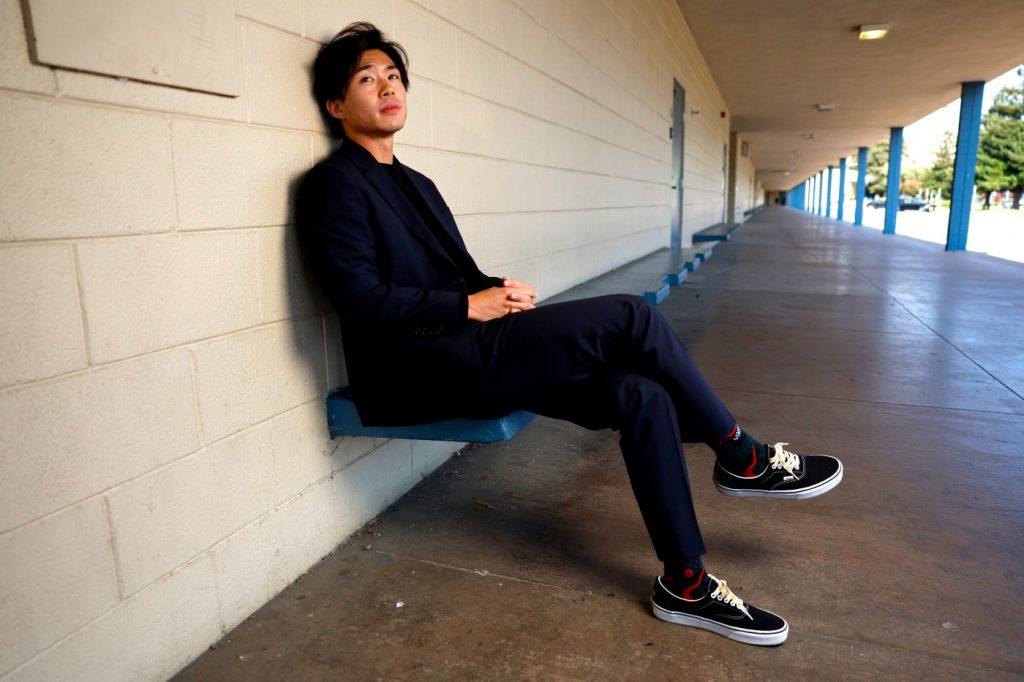FREMONT – What a difference one Fremont summer makes, particularly in the bustling life and career of in-demand filmmaker Sean Wang.
Roughly about this time last year, the Fremont native, along with a cast and crew that encompassed friends, relatives, Wang’s former orthodontist and even one friend’s dad (who portrayed, rather convincingly, a gruff security guard) scurried throughout this East Bay city while filming the coming-of-age dramedy “Didi.”
It was one busy shoot.
“They say try to keep it contained (for a first indie feature),” Wang recalls while in the back of a stretch car bound for the high school he attended. “I thought I wrote a small film, and I wrote like a different location every single day. … We were all over Fremont.”
Fast forward to summer 2024.
The 29-year-old filmmaker who’s already been nominated for an Oscar — for an adorable short about his two gregarious grandmothers, “Nai Nai & Wài Pó” — has returned to Fremont to screen his award-winning, critically praised feature-length film “Dídi” (younger brother) to an eager hometown crowd. Some in the audience had even chipped in to help fund the film, a Sundance Film Festival dual award winner for U.S. Dramatic Audience Award and U.S. Dramatic Special Jury Award for Best Ensemble Cast.
For the charismatic Wang, it’s an indelible moment in what has turned into a pinch-me-I’m-dreaming year.
The semi-autobiographical, R-rated “Dídi” (for language and drug-taking antics) zooms in on 13-year-old Taiwanese American skateboarder/budding videographer Chris (Izaac Wang), a child of immigrant parents in Fremont. The film, set in 2008, captures Chris’ adolescent escapades — the fumbles, first kisses (one of the film’s most priceless sequences), a first toke of pot and his many squabbles with his mom (Joan Chen) and older sis (Shirley Chen). Wang dedicates the film to his mom.
“Dídi” opened last week in New York and Los Angeles, and kickflips its wayinto Bay Area theaters Friday.
Wang this week returned to his roots and met up with friends and even revisited a few formative haunts from his youth — including Irvington High School (where he tried out in vain for a stage production of “Beauty and the Beast”) and the Pacific Commons Shopping Center theater where he and his friends often congregated.
“It feels like a homecoming in a way,” Wang said before the film screened twice for engaged, enthusiastic crowds full of friends, family and community members, including Fremont Mayor Lily Mei, who presented Wang with a certificate of appreciation for thrusting Fremont again into the movie spotlight.
“It also felt like that when we screened at SFFILM (San Francisco Film Festival) because a lot of my hometown friends did go to that premiere too.”
But bringing his debut to Fremont, dubbed the happiest place in America, is next level in a meta way. You could feel that anticipation bubbling up in the community — even over at the bubble tea store Mr. Sun Tea where Wang’ polished off a few interviews.
He suspects the close friends he grew up with who are in the audience will be playing a guessing game of “where the real life inspirations end and the movie begins,” he said.
Earlier in the year, Wang admitted what a surreal whirlwind 2024’s been, with an Oscar nominated documentary short and a debut film that collected two Sundance honors and landed a highly-regarded distributor. It currently boats a 96 percent approval rating on Rotten Tomatoes.
“It’s insane,” he said in March. “It’s amazing. It’s … I clearly don’t have the words.”
But Wang’s been building toward this exceptional streak for awhile, catching the notice of others with a string of shorts made in the wake of a slew of YouTube skateboarding-themed videos. (You can view those on his YouTube channel.)
Some of his documentary shorts touch on themes he’d return to in his film. In “H.A.G.S. (Have a Good Summer),” Wang scans his Horner Middle School yearbook and checks in on his former classmates. These encounters raise topics that foreshadow “Didi,” including how friends would compliment Wang — and in the film, Chris — for being a “cool Asian.”
“I think people would say to me you’re the coolest Asian or stuff like that,” he recalls. “I think in my 20s, I was like OK, well, you don’t really hear that. If you’re the only Asian, you’d have to grow up around a lot of Asians to be the coolest Asian. Like back then it was kind of a net positive. They meant it as a compliment. I took it as a compliment. There was nothing insidious about it. But then you kind of grow up and you kind of break it down. You’re like: OK, what they’re saying is if I’m cool for an Asian then already you’re the best of the lesser tier.”
Wang hadn’t seen a theme like that addressed before in American movies.
“There’s something maybe a little bit more subtle and nuanced,” he said. “Like what does it feel like when everyone kind of looks and talks like you but the culture in the world at large doesn’t reflect you at all? … And every time there was a representation of an Asian in American media, we were, like, not cool. So there’s a divide of the world you are in. And what does that do to your sense of self?”
“Dídi” resonated with Fremont Mayor Lily Mei, who stayed for the Monday screening and noticed how the audience responded to the film with a range of emotions. She reflected about her experience seeing the landmark 1993 film “The Joy Luck Club” — one of the few major American releases with an Asian-fronted cast.
Izaac Wang (center) plays an awkward 13-year-old Fremont boy in the deeply affecting “Didi,” opening in Bay Area theaters this week. (Focus Features)
“Dídi,” entirely shot in Fremont, adds another chapter to the city’s impressive film history. Early on, Fremont’s community of Niles served as a launching pad for silent films; and other noteworthy movies have been shot here, including “Terminator” and the iconic race car scene in “American Graffiti.” Last year saw the black-and-white indie “Fremont” — about an Afghan refugee and translator for the U.S. army relocating to the city. It, too, debuted at Sundance.
Mei appreciates seeing Fremont appearing in the mainstream (it even popped up in an “SNL” episode) and appreciates how “Dídi” reflects a more nuanced depiction of the city and Asian Americans.
“I always have concerns that even though I was born in Chicago or grew up here that people see us as potential foreigners or also the idea of a model minority,” she said. “’Dídi’ opens a wider lens than that.”
Mei presented a certificate to Wang to express “how proud we are to be highlighted and featured as a location” and how his film shared a piece of the city and offered a unique perspective on it.
Wang will be busy as the film fans out in a wider release. He’ll also be taking the film to Taiwan, and after that plans to eventually return to New York where he’ll revisit a screenplay he wrote that preceded “Dídi,” but was put on the back burner since it warranted a bigger production, not exactly fodder for a first feature. Rest assured, though, he says he has no intentions of hopping aboard a franchise.
What also seems like a certainty is that a 2021 lament he expressed in his short “H.A.G.S.” probably can now be put to rest.
Wang, in a voice over in that short, says: “I have these dreams and ambitions, but there’s always a little bit of fear that I’m always like…what if it doesn’t work out?”
It’s worked out well for Sean Wang. Very, very well.


